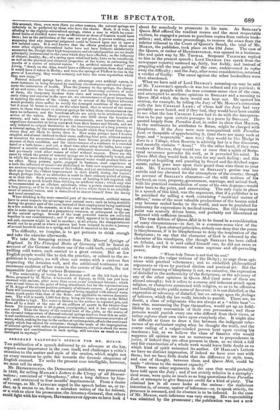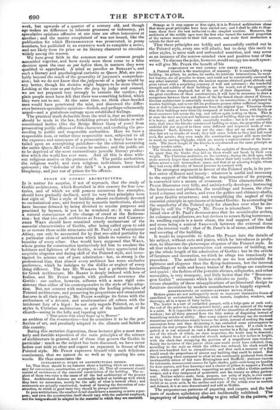SERGEANT TALFOURD'S SPEECH FOR MR. MOON.
THE publication of a speech delivered by an advocate at the bar, argues some importance in the case itself, and challenges a critic's attention to the matter and style of the oration, which might not on every occasion be quite fair towards the forensic eloquence of English counsel. To make the present case intelligible, however, we must tell its story.
Mr. HETHERINGTON, the Democratic publisher, was prosecuted in 1840, for selling HASLAM'S Letters to the Clergy of all .Denomi- nations; convicted of "blasphemy," after a long defence by him- self; and sentenced to four months' imprisonment. From a desire of revenge, as Mr. TALFOURD urged in the speech before us, or ra- ther, as it seems to us, from a mistaken notion of the lex talionis, or a wish to show his prosecutor, the Attorney-General, that others could fight with his weapon, HETHERINGTON appears to have look d
about for somebody to prosecute in his turn. As SHELLEY'S Queen Mob offered the readiest means and the most respectable victims, he engaged a person to purchase copies from various book- sellers ; and, after some proceedings, to remove the cases from the inferior tribunal to the Court of Queen's Bench, the trial of Mr. Moxost, the publisher, took place on the 23d June. The case of the Queen, or rather of HErneantorox, was opened in a business- like and quiet way by Mr. THOMAS. Sergeant TALronan replied to him in the present speech ; Lord DENMAN (we speak from the newspaper reports) summed up, fairly, but feebly, and instead of grappling with the true points of the case, endeavoured to refine away the difficulty ; and the Jury, after some consideration, returned a verdict of Guilty. The cases against the other booksellers were then abandoned.
What we have said of Lord DENMAN'S summing-up may be said of Mr. Tersonsn's speech—it was too refined and too poetical; it omitted to grapple with the true common-sense view of the case, and attempted to attribute opinions IO SHELLEY and a meaning to Queen Mab which the facts would not bear out. He opened his oration, for example, by telling the Jury of Mr. MOXON'S connexion with the late CHARLES LAMB; of whom half the Jury had very probably never heard, and if they had, they would have been unable to see what the late CHARLES LAMB had to do with the interpreta- tion to be put upon certain passages in a poem by SHELLEY. He quoted largely from Paradise Lost, in order to show that MILTON, in the sentiments he attributes to Satan, might be charged with blasphemy. If the Jury were men unacquainted with Paradise Lost, or incapable of apprehending it, (and there are many such at large, and " respectable " men too,) they would be like Madge in Love in a Village, when Rosetta is advising her in a fine discourse, and mentally exclaim "Amin!" On the other hand, if they were readers of MILTON, they would see at once that a spirit of Scrip- tural reverence pervades his work, as it pervaded his mind. In Queen .21fab they would look in vain for any such feeling : and this attempt at beguiling and puzzling by forced and far-fetched argu- ments, rather puts men upon their guard than wins them to your side. Mr. TALFOURD'S criticism on SHELLEY'S genius was too subtile and too elevated for the atmosphere of the courts ; though an account of SHELLEY'S character—of the wild notions of his boyhood, on rent, property, government, marriage, and animal food, with his practical contradiction of some of his own dogmas—would have been to the point, and entertaining. The only topic in place in a speech of this kind, was the argument, that if a publisher is to be punished for selling a work containing "incidental matter of offence," some of the most valuable productions of the human mind may become sealed books to the world, and men be punished for indecency for expressions in medical treatises. But this important point was scarcely driven home, and porbably not illustrated or enforced with sufficient breadth.
The true defence of Queen Mali is to be found in a consideration of many circumstances—in fact, in a common-sense view of the whole case. Upon abstract principles, nobody can deny that the poem is blasphemous, if it be blasphemous to deny the inspiration of the Scriptures to say that the character of God is coloured by the character of his worshipers, (for though SHELLEY has been called an Atheist, and it is said called himself one, he did not seem so much to deny the existence of some supreme and all-pervading power,
"Whose body Nature is and God the soul,"
as to censure the vulgar notions of the Deity) ; to urge these opi- nions with poetical vehemence ; and to embellish philosophical arguments or views by poetical diction and poetical art. But the true legal meaning of blasphemy is not, we conceive, the expression of disbelief in the authenticity of the Scriptures or the advocacy of• any of the other opinions in Queen Mab (and some of theta are absurd enough); but it refers to a coarse and indecent attack upon religion, or characters connected with religion, so as to be offensive and insulting to the public sense of decorum: it is not disbelief, or the expression or advocacy of disbelief, but an outrage upon the feelings of believers, which the law really intends to punish. There are, no doubt, a class of religionists who are always at a "white heat"— men who, renouncing the Pope themselves, would set up an Infal- libility in every conventicle of their own persuasion ; and these persons would punish every one who differed from their views, or rather enforce their own views upon everybody else. It might also be difficult at times to draw a line between the indignant vehe- mence of an enthusiast urging what he thought the truth, and the coarse railing of a vulgar-minded person bent upon venting his insolence; but, as we believe the class of fanatics who would suppress all opinion are not so numerous as to preponderate in juries, if indeed they are often present in them, so we think a full and fair examination of a whole work would leave little doubt as to which kind of spirit animated its author. Of HASLAM'S Letters we have no distinct impression, if indeed we have ever met with them; but we have little doubt that the difference in style, tone, and cast of thought, between them and Queen Mali, could be made "obvious to the meanest capacity." There were other arguments in the case that would probably have told upon the Jury ; and if not strictly relative in a metaphy- sical sense, were quite as much so as long quotations from Paradise Lost, or attempts to give SHELLEY credit for a kind of piety. The criminal law in all cases looks at the animus : the malicious intention is, of course, matter of inference—or, to speak strictly, its presence is assumed, and its absence is to be inferred. In the case of Mr. Moxou, such inference was very strong. His respectability was admitted by the prosecutor ; the publication was not a new
work, but upwards of a quarter of a century old, and though age makes no difference in inherent grossness or indecency, yet speculative opinions offensive at one time are often innocuous at another ; and the matter complained of was not issued, like the publication for which HETHERINGTON was prosecuted, in penny numbers, but published in an extensive work to complete a sene4, and not likely from its price or its literary character to circulate widely among the masses.
We have great faith in the common sense of common people assembled together, and have rarely seen them come to a false decision upon the case as putbefore them, in matters they were qualified to apprehend. A mind so peculiar as SHELLEY s, and such a literary and psychological curiosity as Queen Mab, are pro- bably beyond the reach of the generality of jurymen's comprehen- sion' but we do not know that the judgments of a judge would be any better, though his decision might happen to be more liberal. Looking at the case as put before the jury by judge and counsel, we are not prepared very strongly to censure the verdict ; for plain people must have felt that there was something behind, which they were not to see. At the same time, we think clear-beaded men would have penetrated the mist, and discerned the differ- ence between speculative opinions—foolish, and perhaps vehemently urged—and a gratuitous outrage upon established feelings.
The practical truth deducible from the trial is, that an alteration should be made in the law, forbidding private individuals or self- constituted bodies (like the Bridge Street Gang of yore) from prosecuting public offences of this character, and confining the pro- ceeding to public and responsible authorities. Here we have a respectable man, or rather three respectable men, subjected to all the expenses and annoyance of a prosecution ; a heavy loss is en- tailed upon an enterprising publisher—for the edition containing the entire Queen Mob will of course be useless; and the public are to be deprived of the most extraordinary juvenile literary produc- tion which the world has ever seen. And all this is done with- out religious motive or the pretence of it. The public authorities, the religious world, and even religious individuals, have been quiescent ; the "defender of the faith" is a person convicted of blasphemy, and just out of prison for his offence.



























 Previous page
Previous page